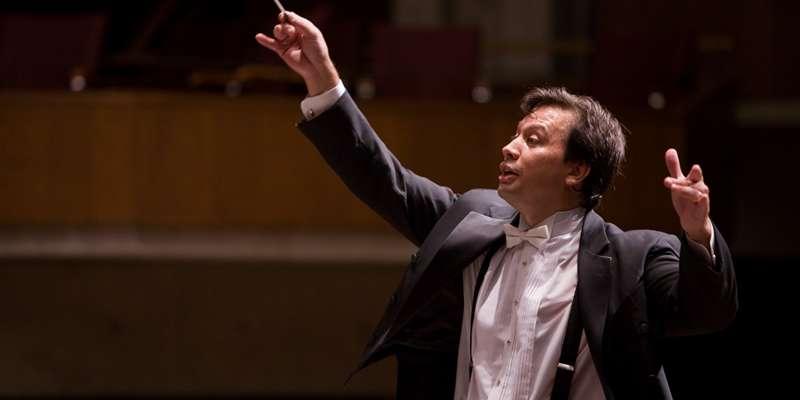by Mike Telin

On Saturday, January 20 at 8:00 pm at E.J. Thomas Hall, Daniel Hege will return to the Akron Symphony podium to lead a program that features Brahms’ Symphony No. 2 and Hungarian Dances Nos. 1 and 5. The concert will also include Prokofiev’s Piano Concerto No. 2 with Gabriela Martinez as soloist. Click here for ticket information.
Hege, who serves as Music Director of the Wichita Symphony as well as Principal Guest Conductor of the Tulsa Symphony and the Binghamton Philharmonic, said that developing Saturday’s program was an organic process.
“When we were talking about repertoire, Christopher Wilkins said the season could really use a Brahms symphony. No. 2 is great, would I like to do that? I said, sure. We talked about soloists and concertos that would nicely contrast with the Brahms, and I mentioned the Prokofiev because I was performing it with Gabriela in Wichita. The two pieces seemed like a nice pairing because the textures are so different and would provide a lot of color contrasts. We thought the program needed something nice to start it off, so I suggested the Hungarian Dances because they are nice get-up-and-go curtain raisers.”
The conductor noted that unlike Brahms’ Symphony No. 1, which confronts listeners with its turmoil and anxiety from the beginning, the Second is very sunny and tuneful — not unlike Beethoven’s Pastoral. “Brahms is trying to say something very intimate that draws listeners in. It’s so beautiful how he uses the famous lullaby. Other composers would have exploited it over and over, but Brahms introduces it and right when you want to hear it more, he moves on to something else, so he’s always pulling you along. Brahms is so clever in that way.”
Prokofiev composed his Second Piano Concerto in 1912 and 1913 and premiered the work in September of that year. The score for that version was destroyed during the Russian Revolution. “After Prokofiev published his Third Piano Concerto he went back and tried to reconstruct the Second,” Hege said. “He joked that he couldn’t do it because it was ten years later and he was at a different point in his life. Unlike his Third Concerto, it’s underplayed, so it’s unfamiliar to audiences but I think they’ll love it. It’s visceral and overt at times but also has introspective moments.”
Hege noted that the Concerto also has a reputation for being quite difficult. “Most pianists say that the piece is extremely challenging technically and you need to create music out of it. Gabriela can really do that.”
Returning to the subject of Brahms, I asked Hege if he thought the composer was ever truly satisfied with anything he had written. “That’s a good question. Brahms was so self-critical, it says a lot that he was ever able to publish any work. The fact that it took him over twenty years to get his first symphony out is a testament to that. It didn’t help that Schumann had declared him the next Beethoven — that only placed an even larger burden on his shoulders.”
Hege said that Brahms was a hard worker. “This was a man who got up every day and composed like a craftsman. To train himself to write well, he would compose ten canons or write two fugues as exercises — like someone going to the gym. He had refined his skills, and that helped him after he published his first symphony because the second, third, and fourth came rather lucidly and quickly by comparison.”
Born in Colorado, Daniel Hege was raised in Idaho. He began studying piano at the age of nine and went on to major in history and music at Bethel College in North Newton, Kansas. He continued his studies at the University of Utah, where he earned a master’s degree in orchestral conducting.
In May of 2016 he returned to Bethel College to give a commencement address during which he encouraged graduates to find their own path. “I got in a little bit of trouble for that.” Hege said he was told that because of the cost of higher education, for many young people following their passion instead of choosing something practical may not lead to success.
“I don’t think those things are necessarily mutually exclusive. If you don’t know what your passion is, then you need to do something of course, because you need to survive in the world. My message to those who do know what their passion is: go after it. A lot of people who are in music have these amazing musical pedigrees, so you can say, ‘How could they not succeed?’ But there’s still no silver bullet that leads to success. It really comes down to what’s within you. If you are motivated enough you will find the way to do it. You will find the next stone to step on to cross the river.”
Published on ClevelandClassical.com January 15, 2018.
Click here for a printable copy of this article



